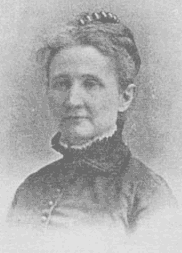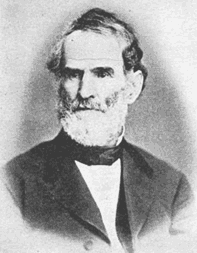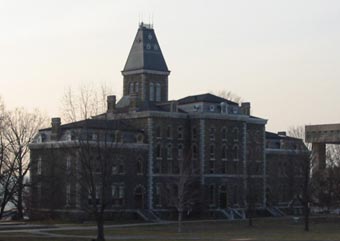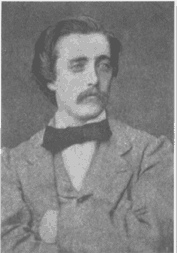|
Jennie McGraw
 Jennie
McGraw wasn't a classically beautiful woman. She might have been what one
would call handsome, even plain. But she made up for whatever flaws she
might have seemed to have had with her own brand of inner beauty,
generosity and, of course, money. Jenny was loaded. Jennie
McGraw wasn't a classically beautiful woman. She might have been what one
would call handsome, even plain. But she made up for whatever flaws she
might have seemed to have had with her own brand of inner beauty,
generosity and, of course, money. Jenny was loaded.

She was born in Dryden, New York in 1840. Her mother's
daddy was John Southworth (September 26, 1796 - December 2, 1877) who
owned the town - almost literally. His landowning was as extensive as his business dealings. Jennie's mother, Rhoda, fell in love with a poor
boy named John McGraw (May 22, 1815 - May 4,
1877). John (pictured on right) didn't stay poor long. Though his
father-in-law was rich and John worked for him, he amassed his own fortune
by shrewd operation of the lumber and mercantile side of the business.
The McGraws and the Southworths seemed inexplicably bound together. John's
older brother, Thomas, had married Rhoda's sister, Sarah Anne Southworth
and after Rhoda's early death by consumption in 1847, John married Nancy
Amelia Southworth who died in 1857. .
McGraw Hall, Cornell University
 John
McGraw was one of the original trustees of Cornell University. He built
the building, at a personal cost of $150,000, that would bear his name and
house the University's library and museum. When McGraw died in 1877, he
left his entire estate to his only daughter, Jennie. All her life, Jennie
was plagued with poor health and though all her money couldn't cure her,
she had the means to seek more suitable climates as needed and so, she
spent much of her life traveling. England was one of her favorite
destinations. During her life she was well known for her charitable
contributions and particularly for her interest in Cornell. When she
married Cornell's librarian in 1880 in Berlin, Germany, she was
already dying from tuberculosis. At her death just the next year -
September 30, 1881 - she left $300,000 to her husband,
$550,000 to her brother Joseph and his children; $200,000 to Cornell for a
library, $50,000 for construction of McGraw Hall, and $40,000 for a
student hospital, $30,000 in trust for the establishment of the Southworth Library Association, whose purpose was to build and maintain a
library in Dryden as a lasting memorial to her mother and her grandfather.
The rest went to the University to use as they pleased. John
McGraw was one of the original trustees of Cornell University. He built
the building, at a personal cost of $150,000, that would bear his name and
house the University's library and museum. When McGraw died in 1877, he
left his entire estate to his only daughter, Jennie. All her life, Jennie
was plagued with poor health and though all her money couldn't cure her,
she had the means to seek more suitable climates as needed and so, she
spent much of her life traveling. England was one of her favorite
destinations. During her life she was well known for her charitable
contributions and particularly for her interest in Cornell. When she
married Cornell's librarian in 1880 in Berlin, Germany, she was
already dying from tuberculosis. At her death just the next year -
September 30, 1881 - she left $300,000 to her husband,
$550,000 to her brother Joseph and his children; $200,000 to Cornell for a
library, $50,000 for construction of McGraw Hall, and $40,000 for a
student hospital, $30,000 in trust for the establishment of the Southworth Library Association, whose purpose was to build and maintain a
library in Dryden as a lasting memorial to her mother and her grandfather.
The rest went to the University to use as they pleased.
It
seems such a bittersweet ending ...
yet it was really no ending at all
... but
rather the beginning of the Great Will Case
Daniel Willard Fiske
The man who married Jennie McGraw in 1880 was Daniel Willard Fiske.
Fiske was born on November 11, 1831 in Ellisburg, which is in the county
of Jefferson in the state of New York. He attended Cazenovia Seminary
located in the town of Cazenovia in Madison County, New York and Hamilton
college in Clinton, New York [
Hamilton College was originally established to be a school for the
children of the Oneida Indians, but, in a twist of fate, "its students
(all male), drawn almost entirely from the small towns and rural areas of
upstate New York, were expected to enter well-prepared in Greek and Latin.
They continued to receive generous instruction in those languages, as well
as in philosophy, religion, history and mathematics, throughout their stay
on the Hill."].
During his sophomore year, he left Hamilton to study
Scandinavian languages in Europe, supporting himself as a correspondent
for the New York Tribune. He spent his last two years in the Uppsala
University in Sweden (founded in 1477, was the first university in
Scandinavia. The initiative in this matter came from the Primate of the
Catholic Church of Sweden, Archbishop Jakob Ulvsson of Uppsala), also
supporting himself by teaching English.
In 1852, he returned to the U.S. and took a job as a librarian at the
Astor Library in N.Y. (This early library, created by funds provided in
the will of John Jacob Astor [ born on September 19, 1792
and died on
November 24, 1875, Astor left $400,000 for founding the Astor library, which
provision was carried out by his son, William Astor], held about
200,000 books, but was not a lending library.) During his stay at Astor
Library, Fiske began his personal library containing a collection of
Icelandic books which would become the largest in America as well as other
topics such as Persian texts and philological works.
|
Fiske, Perrin and Fuller vs. Paul Morphy
|
Fiske, an avid chess player, was approached by
Hardman Phillips Montgomery, a former postmaster of Philadelphia,
about staging a contest between the three best chess players in the
U. S. Fiske liked the idea, but not known for thinking small and
quite aware of the importance of the London International Tournament
in 1851, he proposed instead a National Tournament at which players
from all over the country could meet and test themselves, but also
at which the leading chess players could establish an organization
to promote and encourage chess in America as well as establish
standard rules of play. And so through Fiske the 1st American Chess Congress was conceived.
Fiske lost to Napoleon Marache in the first round of the tournament
(-2+3=0)
-In the game on the left,
Fiske, Perrin and Fuller consulted against
Morphy, resulting in one of Morphy's few losses. -
Through the
Congress, he met and became a close friend to the chess prodigy,
Paul Morphy. Afterwards he wrote what most chess scholars consider
one of the finest tournament books, the "Book of the American Chess
Congress." For the next few years, he edited the "American Chess Monthly," with
Paul Morphy listed as
nominal co-editor. |
When Fiske failed to receive an expected promotion at the
Astor Library in 1859, he resigned and took a position as secretary of the
American Geographical Society where he remained until 1861 when he was
attached to the American Legation (a somewhat less prestigious version of an Embassy)
to Vienna, serving under John Lothrop Motley. Returning to the U.S.
in 1864, he was made editor of the Syracuse Daily Journal until 1866,
followed by that of the Hartford Courant. In 1868 Fiske traveled to Egypt
and Palestine, acting as a correspondent for several newspapers and upon
his return in January of 1869 accepted the position as Professor of
Northern European Languages and as Head Librarian for the new Cornell University.
Fiske held these positions until his resignation in 1883. During his
stewardship, Cornell's library, according Alain White, "[was] kept at the front among those of the rapidly developing American
Universities by his [Fiske's] unwearied effort, contributing of his salary
as well as of his every spare moment to the task." despite the facts that
"Cornell was not then in a position to give him the support he needed. He
had no skilled assistants, no corps of cataloguers, no money for printing
finding-lists or the like."
In 1879
Fiske visited Iceland for his first and only time. One of the places he
visited was Grimsey, an island off the northern
shores of Iceland within the Arctic Circle where the climate is
particularly harsh and unforgiving. Fiske was in awe of the remarkable
inhabitants of this island. Still a poor man, Fiske managed to send them
marble chess sets and boards as well as much needed firewood. At his
death, as a rich man, he bequeathed the island a great sum of money. He is
well remembered in Iceland where his birthday, November 11, is celebrated
each year and where he is considered the Father of Modern Icelandic
Chess . He edited the first Icelandic Chess Magazine in 1901
(published in Venice) and donated thousands of chess books to the
Icelandic libraries. In 1905 Fiske's famous book, Chess in Iceland
and in Icelandic Literature was published posthumously.
There is
The Willard Fiske Center
in the U.S. Embassy in Reykjavík
Daniel Willard Fiske married Jennie
McGraw On July 13, 1880 in Berlin Germany and Honeymooned in Cairo, Egypt, floating
up the Nile in a barge attended by a crew of 17. They had met after
Jennie's father died in 1877, giving her, in addition to the great wealth,
the added responsibility of personally overseeing the projects initiated
through her donations. While Fiske was the Head Librarian, Ms. McGraw was
known for having a keen interest in the part of Cornell's development.
According to Alain White, "...together
they planned the realization of Fiske’s dream. The combination of
technical skill and great wealth catches the attention as much as the
romance of the courtship." But Jennie had already already been
diagnosed with tuberculosis and died on Sept. 30, 1881, just 14 months
after they wed. Many
people saw Fiske as a fortune-hunter; still others saw their
marriage as a match made in heaven. After Jennie died, whatever faction
people belonged to was magnified intensely due to the implications of what
was to be known as The Great Will Case.
When Cornell University was founded, there were
stipulations written into the by-laws that limited the amount of any one
gift to the University. The trustees of the University were well aware of
these stipulations yet, when the total of Jennie Fiske's donation exceeded
the limit by $1,500,000, the trustees decided not to inform Fiske of the
existence of the stipulation. Unfortunately for the University, Fiske was
informed of the trustees duplicity and sued the University. After a 7 year
legal battle that finally ended in the Supreme Court, the University was
forced to return $1,000,000 to members of the McGraw family and $500,000
to Willard Fiske. This
reversal of the will was not seemingly something Fiske wanted, but
something he felt forced to initiate. Not everyone held that opinion,
especially since the University suffered an immediate financial setback.
Fiske made many enemies from that lawsuit.
In
1883 at the inception of the lawsuit, Fiske resigned his position at
Cornell and moved to Tuscana, Italy where rented a large villa in Pistoia
named the Villa Forini Lippi. He lived there until 1888 during
which time he travel to the United States, Egypt, Scandinavia, and other
European countries. With money
from the lawsuit, he was able to purchase and remodel his own place, which
was the Villa Landor in Florence.
From there he carried on his research.
The Villa Forini was built by the Marquis Emilio
Fortini - Lippi for the son Guido. Guido made it an important social and
cultural center. In the 20th century it was converted into the Library of
the Cultural Institutes of the Municpality of Montecatini.
Originally the Villa Gherardescathe, the Villa
Landor was
owned by the family of Walter Savage Landor,
the poet from Warwickshire, England who is
buried in a Florence graveyard near his close friend, Elizabeth
Barrett Browning who had once written that "Robert
[her husband, Robert Browning] always said that he owed more as a writer
to Landor than to any contemporary." The Uris Library for which much of the funds were intended was built by
Henry Sage, John McGraw's former business partner who was so embittered by
what he perceived as Fiske's greed and betrayal, that he had a plaque
placed at the entrance to the library:
The good she tried to do shall stand as if 'twere done
GOD finishes the work by noble souls begun.
In loving memory of JENNIE MCGRAW FISKE whose purpose to
found a great library for Cornell University has been defeated
this house is built and endowed by her friend
HENRY W. SAGE.
As an aside:
Sage was a great benefactor to Cornell and, in fact, his $250,000 donation
to Cornell for a women's dormitory had the effect of guaranteeing an equal
education for both women and men. Andrew Dickson White,
the president of the college went a step further and fought against the
prevailing notion that the women needed a "matron" to supervise the
dormitory, feeling that men and women should be treated equally.
According to Horatio Stevens White's, Life and Correspondence,
Fiske made trips to the United States in 1889, 1890, 1891-1892, 1893,
1895-1896 and 1897. He made trips to Cairo, Egypt in 1888-1889 (with A. D.
White) and 1898 and made unspecified trips to Scandinavia.
Daniel Willard Fiske died at Frankfort-on-the-Main, Germany on September
17, 1904 . He was buried next to his wife, Jennie McGraw Fiske, in their
crypt in the Sage Chapel at Cornell University.
He bequeathed his personal chess library (1200 volumes) to the
National Library of Reykjavik. He left a half million dollars (the amount
from the lawsuit) to Cornell University as well as his personal library
and his fabled Icelandic, Dante, Petrarch, Rhaeto-Romanic and Arabic
Collections valued at over 30 million dollars today
As an aside:
Three "Whites" played parts in this
story: Alain White
(1889-1951) Chess Problemist extraordinaire, promoter of chess, chess
author, botanist and conservationist. He hailed from Litchfield,
Connecticut and is credited with the initiative that led to the creation
of Peoples Forest, the largest forestry event ever held in
Connecticut and a gift to the state from the citizens.
Horatio Stevens White (1852-1934) from
Ithica, N.Y. was Fiske's biographer: Willard Fiske:
Life & correspondence, a biographical study
Andrew Dickson White (1832–1918)
from Homer, N.Y., a state senator, ambassador to Germany and first
president of Cornell. He developed the concept of "free inquiry" which
proposed that only by making all knowledge open and available could
truth prevail. He was Fiske's mentor and life-long friend.
Tying up loose
ends:
Jennie's Will, Op. 27
is a Musical history in two acts. It was commissioned for the bicentennial
of the Village of Dryden, New York and was first performed there, and also
at Cornell University in January 1997
Fiske, on chess:
"Ours is no bloody battle With woe and horror fraught Our joust is of a
gentler kind A measuring of Mind with Mind A tournament of thought"
"Strange priests are they who never straightly walk But all aslant
through sideways passage stalk Who never seek their goals in forward
lines But move askew as fraught with sly designs"
"The world is not likely to tire of an amusement which never repeats
itself, of a game which today presents features as novel and charms as
fresh as those with which it delighted, in the morning of history, the
dwellers on the banks of the Ganges and Indus."
taken from:
ATLANTIC MONTHLY.
A MAGAZINE OF LITERATURE, ART, AND POLITICS.
VOL. V.--JUNE, 1860. NO. XXXII.
and shall leave this portion of our topic with the
fine
verse of the Oriental bard, Ibn ul Mutazz:--
"O thou whose cynic sneers express
The censure of our favorite chess,
Know that its skill is Science' self,
Its play distraction from distress.
It soothes the anxious lover's care;
It weans the drunkard from excess;
It counsels warriors in their art,
When dangers threat and perils press;
And yields us, when we need them most,
Companions in our loneliness."
[Translated by Fiske in that excellent periodical, which no lover
of chess should be without,
The Chess Monthly, edited by Fiske and Morphy, New
York. (Vol. i. p. 92.)]
|

